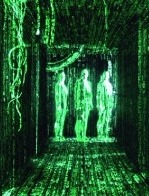The Matrix in our time: the state as video family
by Jon Rappoport (from Nomorefakenews.com)
 In the 1950s, before television had numbed minds and turned them into jelly, there was a growing sense of: the Individual versus the Corporate State.
In the 1950s, before television had numbed minds and turned them into jelly, there was a growing sense of: the Individual versus the Corporate State.
Something needed to be done. People were fitting into slots. They were surrendering their lives in increasing numbers. They were carving away their own idiosyncrasies and their independent ideas.
Collectivism wasn’t merely a Soviet paradigm. It was spreading like a fungus at every level of American life. It might fly a political banner here and there, but on the whole it was a social phenomenon and nightmare.
Television then added fuel to the fire. Under the control of psyops experts, it became, as the 1950s droned on, the facile barrel of a weapon:
“What’s important is the group, the family, peers. Conform. Give in. Bathe in the great belonging…”
Recognize that every message television imparts is a proxy, a fabrication, a simulacrum, an imitation of life one step removed. It isn’t people talking in a park or on a street corner or in a saloon or a barber shop or a meeting hall or a church.
It’s happening on a screen, and that makes it both fake and more real than real.
Therefore, the argument that television can impart important values, if “directed properly,” is specious from the ground up. Television tells lies in its very being. And because it appears to supersede the real, it hypnotizes.
When this medium also broadcasts words and images of belonging and the need to belong, it’s engaged in revolutionary social engineering.
The very opposite of living as a strong, independent, and powerful individual is the cloying need to belong. And the latter is what television ceaselessly promotes.
This is no accident. After World War 2, psychological-warfare operatives turned their attention to two long-term strategies: inculcating negative stereotypes of distant populations, to rationalize covert military plans to conquer and build an empire for America; and disseminating the unparalleled joys of disappearing into a group existence.
When, for example, television promotes “family,” it’s all on the level of fictitiously happy, desperate, yearning, last-chance, problem-resolving, melted-down, trance-inducing, gooey family.
This isn’t, by any stretch, an actual human value. Whether it’s the suburban-lawn family in an ad for the wonders of a toxic medical drug, or the mob family going to the mattresses to fend off a rival, it’s fantasy time in the land of mind control.
Television has carried its mission forward. The consciousness of the Individual versus the State has turned into: love the State. Love the State as family.
The political Left of the 1960s, who rioted against Democratic President Lyndon Johnson, at the Century Plaza Hotel, and ended his hopes to run again in 1968…that Left is now all about the State and its glories and gifts. The collective.
A great deal of the television coverage of mass shootings is now dedicated to bringing home the spurious message: we all grieve together and heal together.
In the only study I have been able to find, Wictionary partially surveys the scripts of all television shows from the year 2006, to analyze the words most frequently broadcast to viewers in America.
Out of 29,713,800 words, including the massively used “a,” “an,” “the,” “you,” “me,” and the like, the word “home” ranks 179 from the top. “Mom” is 218. “Together” is 222. “Family” is 250.
This usage reflects an unending psyop.
Are you with the family or not? Are you with the group, the collective, or not? Those are the blunt parameters.
“When you get right down to it, all you have is family.” “Our team is really a family.” “You’re deserting the family.” “You fight for the guy next to you.” “Our department is like a family.” “Here at Corporation X, we’re a family.” “Above all, this is a community.”
The committee, the group, the company, the sector, the planet, the family.
The goal? Submerge the individual and tie him inexorably to a group.
Individual achievement, imagination, creative power? Not on the agenda. Something for the dustbin of history.
All you need to do is fall into the arms of a group. After that, everything is settled. You can care exclusively about the collective.
Aldous Huxley, Brave New World: “‘Ninety-six identical twins working ninety-six identical machines’! The voice was almost tremulous with enthusiasm. ‘You really know where you are. For the first time in history.’”
George Orwell, 1984: “The two aims of the Party are to conquer the whole surface of the earth and to extinguish once and for all the possibility of independent thought.”
Television seeks to emphasize one decision: inclusion or exclusion. Exclusion is portrayed as the only condition that is possible if you aren’t part of the group. And exclusion carries the connotation of exile, excommunication, and criminality.
The soap opera is the apotheosis of television. The long-running characters in Anytown are irreversibly enmeshed in one another’s lives. There’s no escape. And with that comes mind-numbing meddling.
“I’m just trying to help you realize we all love you (in chains).”
“Your father, rest his soul, would never have wanted you to do this to yourself…”
“How dare you set yourself apart from us. Who do you think you are?”…
This post has been read 1963 times!


